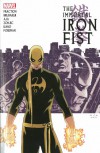A Spoopy Love Affair With Books
Jean, 39, lover of sci-fi, horror and fantasy, reader of comic books, conqueror of genre fiction.
Currently reading
Review: The Phantom of the Opera by Gaston Leroux


Well, that was crappy. Things do happen in this novel, and yet, it somehow manages to be completely anticlimactic. How? Everything important happens "off-screen" to characters Leroux never bothered to even consider that someone would want to read about, despite being the lead characters in the novel. No, instead, let's have chapter upon chapter in first-person from the point of view of a character that's barely been introduced until the last third of the novel when he's narrating! Erik and Christine? PHHHT! Who'd want to read about the main protagonist/antagonist?! The most interesting chapter in the damn thing is when Christine describes being taken underground by the "Angel," and even then, it's waaaaaay after the fact. I suppose Leroux thought he was creating mystery and suspense. It doesn't work. I can't imagine how this was published as a serial, when no chapter left me wanting more.
The characters are insufferable. The only one I felt mildly for was Christine, who had to deal with Raoul's bratty behavior, and Erik's homicidal stalking, the managers not really caring that she disappears and suspecting her of orchestrating some of Erik's tricks, Carlotta's loyal audience giving her a hard time every time she sings... I had a basic female empathy for her, even when she was being frustratingly naive. Raoul can go eat a bag of turds for life; Leroux tried to excuse his behavior by telling us it's his inexperience in love. Generally an inexperienced person doesn't accuse the person he loves of being an unfaithful whore every other sentence, as she's trying to confess what happened. Sighs. And Erik... just forget it.
All of it is written as an investigation of mysterious events that transpired at the Opera, making it rather a precursor to modern procedurals, but also making it distant and difficult to care about anyone. It's one saving grace is how short it is.
So why is my rating so generous? Well... I said 'its one saving grace,' but it has another, and that's that Leroux came up with an idea so fantastical, so lurid and interesting, that a hundred and five years later, it still belongs in our public consciousness. He did it poorly, but it's inspired so many adaptations, so many people to take the bare bones of what he laid out and elaborate on. And that is more than a noteworthy feat.
My Modern Library edition also includes an analysis of the text, which discusses such things as antisemitism and Freudian psychology. Which I feel is giving far too much credit. And also an introduction by Anne Perry, which just creeped me the hell out with her rhetoric espousing sympathetic killers.









